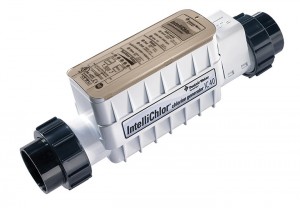Blog
The Truth About Arizona Salt Water Pools

One of the most frequently asked questions is about “salt water pools”. After responding to this question for several years, it is evident that there is still a lot of mystery about what a “salt water pool” really is. I hope this article will eliminate the mystery and help people understand this technology..the good..the bad..and the ugly.
Generally, people assume that a “salt water pool” means that the water is simply salt water and it is much like swimming in the Caribbean. A salt water pool is a bit of a misnomer. A more accurate way to refer to this technology is chlorine generation. Salt (sodium chloride-NaCl) is added to the pool and as the water passes through the chlorine generator cell and an electrical discharge converts the salt into chlorine (hypochlorous acid-HOCl). I just had a gentleman say today that he had a salt water pool and he was shocked that it is actually generating CHLORINE. He also stated that he never had to add anything to his water. This is another consumer who was baffled and misled by the hyperbole of a slick salesman.
As with anything, there are pros and cons about the technology. I believe that a customer should carefully weigh their decision to install a chlorine generator and they should fully understand the pros and cons before making a decision. I want our customers to be fully informed so that they aren’t surprised at the maintenance involved with a swimming pool (or spa) equipped with a chlorine generator.
The good….
- It is viable technology—it works
- There is less need to buy auxiliary chlorine (in most cases)
- People perceive that the water feels softer
- People perceive that there is little or no chlorine smell
- Most chlorine generators have the ability to “power boost” or shock the pool
The bad…..
- The upfront costs of the generator can be significant
- The generator can be temperamental—not producing chlorine when you think it is or producing too much causing excessively high chlorine levels
- The cell needs to be cleaned periodically which is a bit of a messy job
- High phosphate levels can cause the generator to malfunction (can be addressed easily with the regular addition of a phosphate remover)
- It doesn’t generate chlorine well in cold water (winter months) so the water should be treated with an alternative source of chlorine. This is specifically applicable in many parts of the country, specifically in the Pacific Northwest where we are located, due to cold but mild winters.
- pH tends to run consistently high requiring frequent additions of muriatic acid.
- Accelerates calcium build-up 5x!!
The ugly……
- Salt can damage equipment (pumps, heaters, handrails) and decks which can eliminate any cost savings on chlorine. This is a well-known fact in the pool industry and iwell documented in recent years in our industry publications. Salt is corrosive and most people clearly understand this.
- Failing to manage the consistently high pH levels can cause calcium precipitant to adhere to the surface of the pool causing it to become very rough.
Just wanted to thank the folks at Aqua Pros for this great article! Feel free to click the link for other articles pertaining to pool maintenance…www.aquaspas.com
